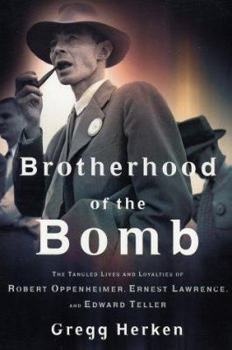Brotherhood of the Bomb: The Tangled Lives and Loyalties of Robert Oppenheimer, Ernest Lawrence, and Edward Teller
Select Format
Select Condition 
Book Overview
Gregg Herken's Brotherhood of the Bomb is the fascinating story of the men who founded the nuclear age, fully told for the first time The story of the twentieth century is largely the story of the... This description may be from another edition of this product.
Format:Hardcover
Language:English
ISBN:0805065881
ISBN13:9780805065886
Release Date:September 2002
Publisher:Henry Holt & Company
Length:464 Pages
Weight:1.85 lbs.
Dimensions:1.5" x 6.4" x 9.6"
Customer Reviews
4 ratings
Well Researched, Well Written
Published by Thriftbooks.com User , 16 years ago
I love reading well-written books! The Brotherhood of the Bomb is one such book. I've read a fair share of Manhattan Project/Oppenheimer books. Brotherhood does a great job of widening the focus and putting three men (Oppenheimer, Lawrence and Teller) in view, instead of just one. Much of the Oppenheimer material was familiar to me from American Prometheus or The Making of the Atomic Bomb (both excellent), but this book put those events in the context of the ongoing (and often fractious) relationships between these three men. In some ways we're still living in their shadows. Great Book!
This book is VERY WELL WRITTEN
Published by Thriftbooks.com User , 19 years ago
I'm only a few chapters into the book at the moment. However, I am finding the book to be very interesting and extremely well researched. I totally disagree with the other reviews on this one. The book is very well written. I can hardly put it down. Excellent job!
"physicists have known power"
Published by Thriftbooks.com User , 21 years ago
Herken has written a wonderful account of the United States's programs to develop an atomic bomb during World War II and to build an H-bomb during the 1950s. But beyond chronicling scientific and technological developments, the book explores the world of American politics and government and how it was influencing the physics side of things. More importantly to the work's argument, however, Herken also delves into the scientists personal lives--their friendships, their hobbies, their activities. To that end, he focuses on three:--Ernest Orlando Lawrence, the driven, imperious, South Dakotan who directed the Rad(iation) Lab at Berkeley and created--ruled, some would say--a "cyclotron republic" there--Edward Teller, the temperamental Hungarian emigre who fled to the United States from Communists in his native land and from Nazis in Germany, and who, to the exclusion of almost everything else, pursued the H-bomb at Los Alamos and then at Livermore (an interesting anecdote describes how, at the Trinity test, he stunned his companions by putting on suntan lotion, gloves, and welder's glasses)--J. Robert "Oppie" Oppenheimer (according to Herken, the "J" stands for nothing; other sources have it as "Julius"), the introspective director of the Manhattan Project with an affinity for Eastern religions and leftist, even Communist, causesThese three figure prominently in the tale which begins at Berkeley in the 1930s, where the great physicists of the day began to coalesce. World War II took most of them to Los Alamos in some way or another, although Lawrence's work was mostly at the Rad Lab developing ways of enriching uranium. By the end of the war, splits were beginning to appear as the scientists became more aware of the political and moral implications of their work. While Oppenheimer became something of a celebrity in the nation at large and served as an advisor to a handful of government commissions and committees, Lawrence fervently lobbied for government funding for bigger and faster cyclotrons, and Teller ever more energetically pursued his Super.Oppenheimer, who had been loosely affiliated with the Communist Party in the late 1930s, had been under FBI scrutiny--including wiretaps of his phone--ever since he became director at Los Alamos and gained a security clearance then only at Leslie Groves' insistence. In the mid-1950s, as the penetration of the bomb project came to light, and in the wake of the McCarthy hearings, and after Oppenheimer had voiced his opposition to the Super, the physicist's political leanings began to concern government officials. Hearings were held, which included somewhat ambiguous though negative testimony from Teller, and Oppenheimer's security clearance was revoked.Of course, this is just the briefest of summaries. Other books, notably and admirably Rhodes', have detailed both bomb programs, but Herken's adds depth to the stories by focusing on the personal relationships between the scientists and demonstrating h
first rate history of science, told like a novel
Published by Thriftbooks.com User , 21 years ago
This is a wonderful book about one of the most controversial developments of the last century: the development of the atomic and then hydrogen bombs. At the core of the book are the three scientists - Robert Oppenheimer, Ernest Lawrence, and Edward Teller - who had the greatest impact, both from the technical problems they confronted and from the political points of view they advocated. Though a bit rarified in terms of general interest as it focuses on science advisors, this for me was a fascinating recounting of the decisions that led to the arms race and eventually cost $5.5 trillion and produced 120,000 nuclear weapons. It also evokes with great eloquence the domestic repercussions of the cold war and paranoia of the 1950s.Herken writes well, though at times his style was strange for me. For example, one person evaluated a speech with a "gimlet eye." (I had to look that up.) Nonetheless, Herken's writing is dramatic and fast paced, far far better than I would normally expect from an American academic. Recommended with enthusiasm.




